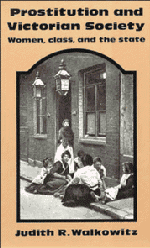Book contents
- Frontmatter
- Contents
- Preface
- Introduction: The Revolt of the Women
- Part I Prostitution, Social Science, and Venereal Disease
- Part II The Contagious Diseases Acts, Regulationists, and Repealers
- Part III Two Case Studies: Plymouth and Southampton Under the Contagious Diseases Acts
- 8 Plymouth and Southampton Under the Contagious Diseases Acts
- 9 The Repeal Campaign in Plymouth and Southampton, 1870–4
- 10 The Making of an Outcast Group: Prostitutes and Working Women in Plymouth and Southampton
- 11 The Hospitals
- 12 The Local Repeal Campaign, 1874–86
- Epilog
- Notes
- Selected Bibliography
- Index
8 - Plymouth and Southampton Under the Contagious Diseases Acts
Published online by Cambridge University Press: 01 June 2011
- Frontmatter
- Contents
- Preface
- Introduction: The Revolt of the Women
- Part I Prostitution, Social Science, and Venereal Disease
- Part II The Contagious Diseases Acts, Regulationists, and Repealers
- Part III Two Case Studies: Plymouth and Southampton Under the Contagious Diseases Acts
- 8 Plymouth and Southampton Under the Contagious Diseases Acts
- 9 The Repeal Campaign in Plymouth and Southampton, 1870–4
- 10 The Making of an Outcast Group: Prostitutes and Working Women in Plymouth and Southampton
- 11 The Hospitals
- 12 The Local Repeal Campaign, 1874–86
- Epilog
- Notes
- Selected Bibliography
- Index
Summary
The Contagious Diseases Acts … have both directly and indirectly promoted the objects of sanitary and municipal police. They have purged the towns and encampments to which they have been applied of miserable creatures who were mere masses of rottenness and vehicles of disease, providing them with asylums where their suffering could be temporarily relieved even if their malady was beyond cure, and where their better nature was probably for the first time touched by human sympathy…
—“Report from the Royal Commission on the Administration and Operation of the Contagious Diseases Acts 1866 – 69 (1871),” P.P., 1871, XIX, p. 11.In 1882, repealers glumly reviewed the select committee's favorable report on the working of the C.D. acts. The ordeal of the long-drawn out inquiry had ended badly for the repeal side. Most committee members had simply accepted official accounts of the beneficial operation of the acts while dismissing repeal arguments and evidence of police abuse as unsubstantiated and malicious propaganda. The majority report included some additional thrusts at the repeal movement. It observed that “the majority of the more intelligent and respectable classes in these districts would be strongly opposed to the repeal of the Acts,” and pointedly noted that “the strength of the opposition [to the acts] in each locality is [proportional] to its distance from the places where they are in operation.”
However strong their support in the north, the failure of abolitionists to sway public opinion in subjected areas remained a serious flaw in their overall political strategy.
- Type
- Chapter
- Information
- Prostitution and Victorian SocietyWomen, Class, and the State, pp. 151 - 170Publisher: Cambridge University PressPrint publication year: 1980



